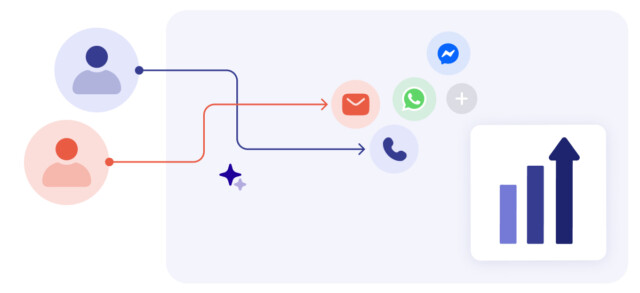AI Cloud Services
Discover how AI cloud services are revolutionizing efficiency for contact centers of all sizes
What are AI Cloud Services?
AI cloud services combine the power of cloud computing and artificial intelligence to deliver scalable, secure, and intelligent solutions that enhance enterprise operations. In contact centers, they automate key functions, enable real-time data analysis, and improve decision-making. This integration supports virtual agents for handling common inquiries, intelligent call routing through speech recognition, and tools that boost agent performance and productivity.

The Benefits of AI Cloud Services for Call Centers
Measurable Improvements in Customer Satisfaction
Diabolocom’s AI-powered cloud services for contact centers can be leveraged to achieve measurable improvements in customer satisfaction──driven by faster (and more accurate) responses, personalized interactions, and consistent service quality. Achieve omnichannel consistency with uniform support management across channels, evaluate scripts and intervene proactively in high-risk calls, and lower wait times with intelligent routing.

Scalable Infrastructure
AI cloud services offer scalable infrastructure that adjusts automatically during peak hours or seasonal fluctuations—eliminating performance lags, service interruptions, or the need for costly hardware upgrades. In addition, pay-as-you-go models scale together with business operations, avoiding over-allocation of resources which results in higher cost-efficiency. These features help ensure that your call centers maintains consistent service quality while remaining resilient, secure, and future-ready.

The challenges of AI Cloud Services for Call Centers
Data Privacy and Compliance
AI Cloud Services store a significant amount of customer data that needs to remain private, secure, and conform to the law. Business organizations are thus required to strictly comply with rules and regulations such as GDPR, HIPAA, and PCI-DSS to conduct business without legal or financial issues.
System Integration Complexity
Integrating AI Cloud Services into legacy systems or fragmented software can be challenging. Ensuring smooth compatibility with CRMs, ERPs, and third-party tools demands strong APIs, skilled developers, and well-planned architecture.
Uses of AI Cloud Services for Contact Centers
Multi-channel Integration with AI Cloud Services
For multichannel AI integration, connect voice, chat, email, and more using standard APIs. Platforms like Diabolocom enable real-time data sync for consistent, intelligent engagement across all channels.

FAQ
How do AI Cloud Services improve customer experience?
AI cloud services significantly enhance the customer experience by enabling instant decision-making and personalized interactions at scale. They automate repetitive tasks, reduce wait times, and ensure consistent service across platforms. By leveraging historical data and intelligent insights, organizations can predict customer needs, helping build strong and productive relationships.
Can pre-existing systems be integrated smoothly with AI Cloud Services?
Yes, AI Cloud platforms like Diabolocom offer APIs, SDKs, and integration tools to connect with CRMs, ERPs, and legacy systems. This allows for seamless data sharing and workflow automation across existing infrastructure. Proper integration enhances performance and extends the value of both old and new technologies.
What industries use AI Cloud Services?
AI Cloud Services have seen widespread usage in diverse industries such as healthcare, finance, retail, telecommunications, and customer service. These sectors benefit from the automation, predictive analytics, and personalized experiences that AI offers. Businesses looking to scale operations or optimize decision-making can leverage these services efficiently.
What’s the difference between AI Cloud and traditional AI?
Traditional AI typically runs on local servers and requires significant IT resources to maintain. In contrast, AI Cloud Services provide instant, scalable access to AI tools via the internet. They offer faster deployment, lower upfront costs, and greater flexibility for growing businesses.